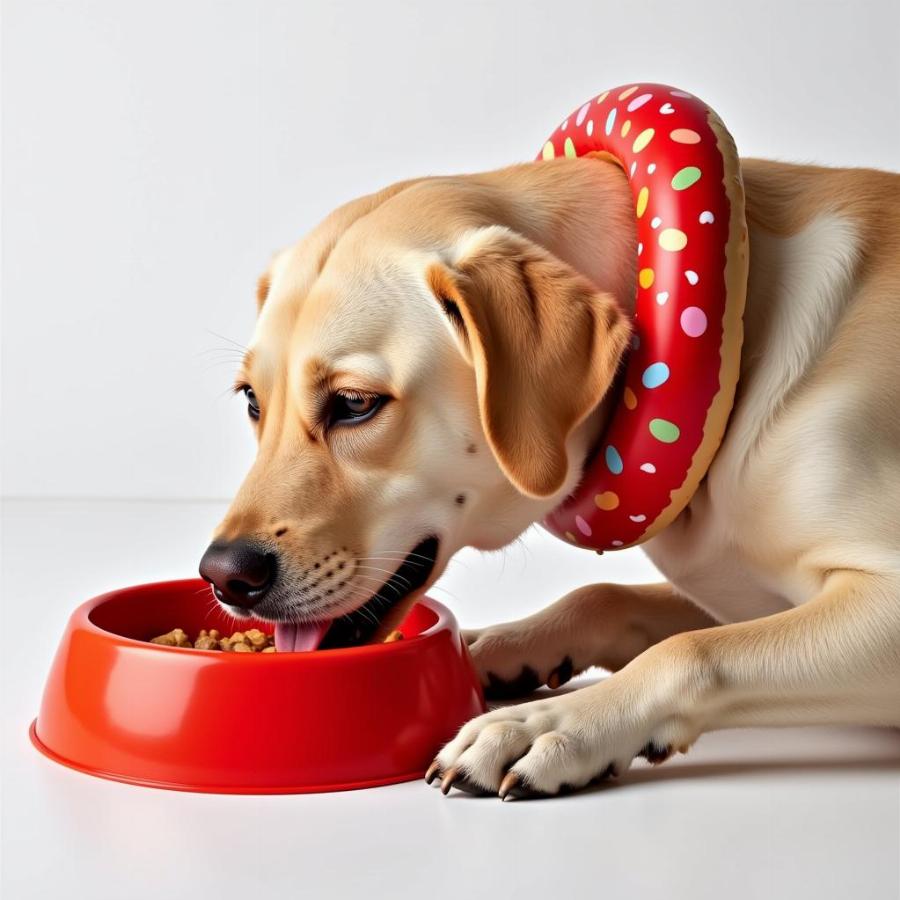Donut collars, also known as inflatable collars or e-collars, are a popular alternative to the traditional cone of shame. They offer a more comfortable and less restrictive way to prevent dogs from licking or biting wounds, surgical sites, or hot spots. This comprehensive guide will delve into the benefits, uses, and selection of donut collars for your furry friend.
Understanding the Need for Donut Collars
Why would a dog need a collar that looks like a tasty treat? Well, it’s not about indulging their sweet tooth. It’s about protecting them during healing. When dogs are injured or recovering from surgery, their natural instinct is to lick the affected area. While this might seem like a way to soothe themselves, it can actually introduce bacteria and disrupt the healing process. That’s where donut collars come in handy. They act as a barrier, preventing your dog from reaching the wound.
When are Donut Collars Most Useful?
Donut collars are particularly helpful in situations like:
- Post-surgery recovery: After being spayed, neutered, or undergoing other surgical procedures.
- Wound healing: Preventing licking or biting at injuries, cuts, or hotspots.
- Skin conditions: Protecting areas affected by allergies, dermatitis, or other skin irritations.
Benefits of Using a Donut Collar
Compared to the traditional plastic cone, donut collars offer several advantages. They are generally more comfortable for dogs, allowing them to eat, drink, sleep, and navigate their surroundings with greater ease. They’re also less likely to bump into furniture or walls, reducing the risk of further injury or frustration. Plus, let’s be honest, they’re much cuter!
Improved Comfort and Mobility
Traditional cones can be cumbersome and restrict a dog’s peripheral vision. Donut collars, on the other hand, allow for greater freedom of movement and a wider field of view. This reduces stress and anxiety, promoting a smoother recovery process.
Reduced Stress and Anxiety
The less restrictive nature of donut collars can contribute to a calmer and more relaxed dog. This is especially important during times of healing, as stress can hinder the recovery process.
Easier Eating and Drinking
Unlike cones, which can make it difficult for dogs to access their food and water bowls, donut collars allow for relatively normal eating and drinking habits.
 Dog Eating with a Donut Collar
Dog Eating with a Donut Collar
Choosing the Right Donut Collar for Your Dog
Selecting the right donut collar requires considering your dog’s size and breed. Measure your dog’s neck circumference accurately to ensure a snug but not constricting fit. The collar should be large enough to prevent your dog from reaching the wound but not so large that it hinders their movement or vision.
Sizing and Fit
It’s crucial to choose the correct size donut collar. A collar that’s too small will be uncomfortable and ineffective, while one that’s too large can slip off or obstruct your dog’s vision. Always refer to the manufacturer’s sizing guide and measure your dog carefully.
Material and Durability
Donut collars are typically made from durable, washable materials like nylon or PVC. Consider the material’s durability and ease of cleaning when making your selection.
Adjustability and Features
Some donut collars offer adjustable straps for a more customized fit. Others may feature additional features like reflective strips for increased visibility during nighttime walks.
How to Introduce Your Dog to a Donut Collar
Introducing a donut collar gradually can help your dog adjust to it more easily. Start by letting your dog sniff and explore the collar. Then, try putting it on for short periods, gradually increasing the duration as your dog becomes more comfortable. Positive reinforcement with treats and praise can make the process more enjoyable for your furry friend.
Alternatives to Donut Collars
While donut collars are a great option for many dogs, they may not be suitable for every situation. Alternatives such as dog protective collar or cone alternatives for dogs might be necessary. You can also explore options like soft cones or inflatable dogs inflatable collar. For more information on whether or not your dog can safely consume certain foods during recovery, check out our article on can dogs eat donuts. Remember, it’s always best to consult with your veterinarian to determine the most appropriate solution for your dog’s specific needs.
Conclusion
Donut collars are a comfortable and effective alternative to traditional cones, offering a more humane and less restrictive way to protect your dog during healing. By choosing the right size and introducing the collar gradually, you can help your dog adjust to wearing it and ensure a smoother recovery. Remember, a comfortable dog is a happy dog!
FAQ
- Are donut collars safe for dogs? Yes, when used correctly and appropriately sized.
- Can my dog sleep with a donut collar? Yes, the design allows for comfortable sleeping.
- How do I clean a donut collar? Most are washable; follow the manufacturer’s instructions.
- Can my dog still play with a donut collar? Yes, but supervise play to prevent damage to the collar or injury.
- How long should my dog wear a donut collar? As long as directed by your veterinarian.
- What if my dog keeps trying to take the collar off? Consult your vet for alternative solutions.
- Are there different types of donut collars? Yes, sizes, materials, and features vary.
Other Helpful Resources
Check out our articles on donut cone for dogs for more information on this helpful tool.
Beaut Dogs: Your Trusted Source for Dog Care
Beaut Dogs is your one-stop shop for all things dog-related. We provide expert advice, helpful tips, and in-depth information on various dog breeds and their care. For personalized support and answers to your specific questions, contact us at [email protected] (Email address). We’re here to help you provide the best possible care for your beloved canine companion. Visit https://beautdogs.com for more information.